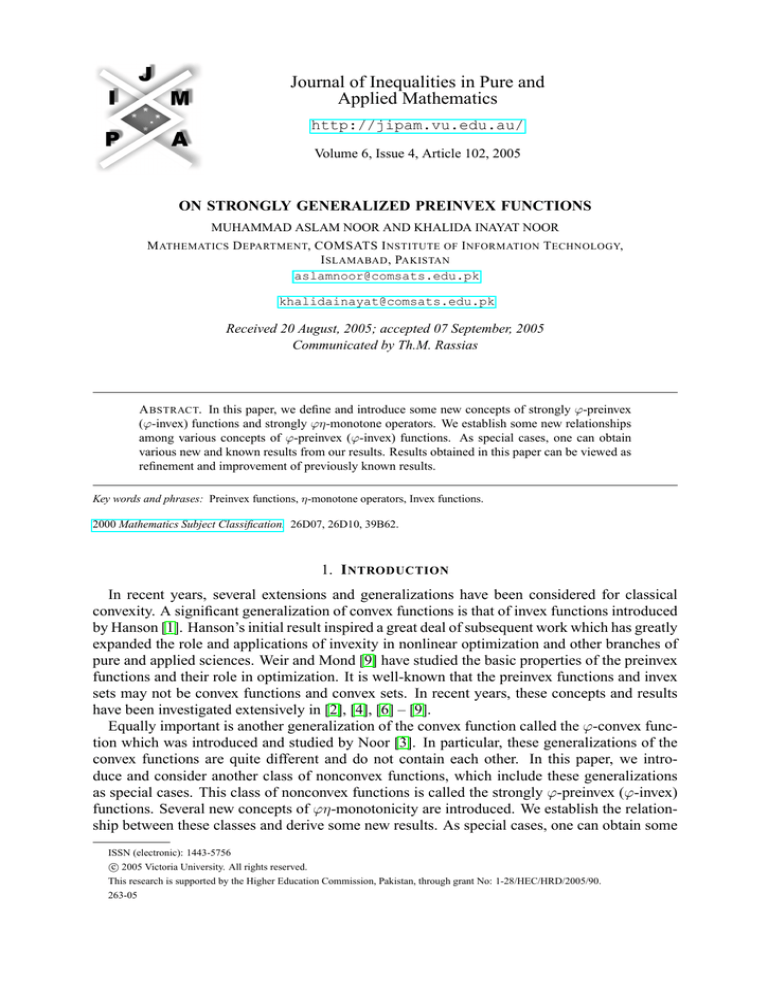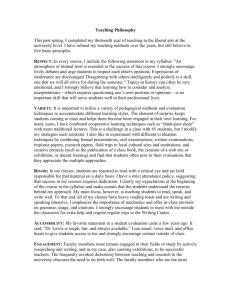
Journal of Inequalities in Pure and
Applied Mathematics
http://jipam.vu.edu.au/
Volume 6, Issue 4, Article 102, 2005
ON STRONGLY GENERALIZED PREINVEX FUNCTIONS
MUHAMMAD ASLAM NOOR AND KHALIDA INAYAT NOOR
M ATHEMATICS D EPARTMENT, COMSATS I NSTITUTE OF I NFORMATION T ECHNOLOGY,
I SLAMABAD , PAKISTAN
aslamnoor@comsats.edu.pk
khalidainayat@comsats.edu.pk
Received 20 August, 2005; accepted 07 September, 2005
Communicated by Th.M. Rassias
A BSTRACT. In this paper, we define and introduce some new concepts of strongly ϕ-preinvex
(ϕ-invex) functions and strongly ϕη-monotone operators. We establish some new relationships
among various concepts of ϕ-preinvex (ϕ-invex) functions. As special cases, one can obtain
various new and known results from our results. Results obtained in this paper can be viewed as
refinement and improvement of previously known results.
Key words and phrases: Preinvex functions, η-monotone operators, Invex functions.
2000 Mathematics Subject Classification. 26D07, 26D10, 39B62.
1. I NTRODUCTION
In recent years, several extensions and generalizations have been considered for classical
convexity. A significant generalization of convex functions is that of invex functions introduced
by Hanson [1]. Hanson’s initial result inspired a great deal of subsequent work which has greatly
expanded the role and applications of invexity in nonlinear optimization and other branches of
pure and applied sciences. Weir and Mond [9] have studied the basic properties of the preinvex
functions and their role in optimization. It is well-known that the preinvex functions and invex
sets may not be convex functions and convex sets. In recent years, these concepts and results
have been investigated extensively in [2], [4], [6] – [9].
Equally important is another generalization of the convex function called the ϕ-convex function which was introduced and studied by Noor [3]. In particular, these generalizations of the
convex functions are quite different and do not contain each other. In this paper, we introduce and consider another class of nonconvex functions, which include these generalizations
as special cases. This class of nonconvex functions is called the strongly ϕ-preinvex (ϕ-invex)
functions. Several new concepts of ϕη-monotonicity are introduced. We establish the relationship between these classes and derive some new results. As special cases, one can obtain some
ISSN (electronic): 1443-5756
c 2005 Victoria University. All rights reserved.
This research is supported by the Higher Education Commission, Pakistan, through grant No: 1-28/HEC/HRD/2005/90.
263-05
2
M UHAMMAD A SLAM N OOR
AND
K HALIDA I NAYAT N OOR
new and correct versions of known results. Results obtained in this paper present a refinement
and improvement of previously known results.
2. P RELIMINARIES
Let K be a nonempty closed set in a real Hilbert space H. We denote by h·, ·i and k · k the
inner product and norm respectively. Let F : K → H and η(·, ·) : K × K → R be continuous
functions. Let ϕ : K −→ R be a continuous function.
Definition 2.1 ([5]). Let u ∈ K. Then the set K is said to be ϕ-invex at u with respect to η(·, ·)
and ϕ(·), if
u + teiϕ η(v, u) ∈ K, ∀u, v ∈ K, t ∈ [0, 1].
K is said to be an ϕ-invex set with respect to η and ϕ, if K is ϕ-invex at each u ∈ K. The ϕinvex set K is also called a ϕη-connected set. Note that the convex set with ϕ = 0 and η(v, u) =
v − u is an ϕ-invex set, but the converse is not true. For example, the set K = R − − 21 , 12 is
an ϕ-invex set with respect to η and ϕ = 0, where
(
v − u,
for v > 0, u > 0 or v < 0, u < 0
η(v, u) =
u − v,
for v < 0, u > 0 or v < 0, u < 0.
It is clear that K is not a convex set.
Remark 2.1.
(i) If ϕ = 0, then the set K is called the invex (η-connected) set, see [2], [4],
[9].
(ii) If η(v, u) = v − u, then the set K is called the ϕ-convex set, see Noor [3].
(iii) If ϕ = 0 and η(v, u) = v − u, then the set K is called the convex set.
From now onward K is a nonempty closed ϕ-invex set in H with respect to ϕ and η(·, ·),
unless otherwise specified.
Definition 2.2. The function F on the ϕ-invex set K is said to be strongly ϕ-preinvex with
respect to η and ϕ, if there exists a constant µ > 0 such that
F (u + teiϕ η(v, u)) ≤ (1 − t)F (u) + tF (v) − µt(1 − t)kη(v, u)k2 ,
∀u, v ∈ K,
t ∈ [0, 1].
The function F is said to be strongly ϕ-preconcave if and only if −F is ϕ-preinvex. Note that
every strongly convex function is a strongly ϕ-preinvex function, but the converse is not true.
Definition 2.3. The function F on the ϕ-invex set K is called strongly quasi ϕ-preinvex with
respect to ϕ and η, if there exists a constant µ > 0 such that
F (u + teiϕ η(v, u)) ≤ max{F (u), F (v)} − µt(1 − t)kη(v, u)k2 ,
∀u, v ∈ K,
t ∈ [0, 1].
Definition 2.4. The function F on the ϕ-invex set K is said to be logarithmic ϕ-preinvex with
respect to ϕ and η, if there exists a constant µ > 0 such that
F (u + teiϕ η(v, u)) ≤ (F (u))1−t (F (v))t − µt(1 − t)kη(v, u)k2 ,
u, v ∈ K,
t ∈ [0, 1],
where F (·) > 0.
From the above definitions, we have
F (u + teiϕ η(v, u)) ≤ (F (u))1−t (F (v))t − µt(1 − t)kη(v, u)k2
≤ (1 − t)F (u) + tF (v) − µt(1 − t)kη(v, u)k2
≤ max{F (u), F (v)} − µt(1 − t)kη(v, u)k2
< max{F (u), F (v)} − µt(1 − t)kη(v, u)k2 .
J. Inequal. Pure and Appl. Math., 6(4) Art. 102, 2005
http://jipam.vu.edu.au/
O N S TRONGLY G ENERALIZED P REINVEX F UNCTIONS
3
For t = 1, Definitions 2.2 and 2.4 reduce to the following, which is mainly due to Noor and
Noor [5].
Condition A.
F (u + eiϕ η(v, u)) ≤ F (v), ∀u, v ∈ K,
which plays an important part in studying the properties of the ϕ-preinvex (ϕ-invex) functions.
For ϕ = 0, Condition A reduces to the following for preinvex functions
Condition B.
F (u + η(v, u)) ≤ F (v),
∀u, v ∈ K.
For the applications of Condition B, see [2, 4, 7, 8].
Definition 2.5. The differentiable function F on the ϕ-invex set K is said to be a strongly
ϕ-invex function with respect to ϕ and η(·, ·), if there exists a constant µ > 0 such that
F (v) − F (u) ≥ hFϕ0 (u), η(v, u)i + µkη(v, u)k2 ,
∀u, v ∈ K,
where Fϕ0 (u) is the differential of F at u in the direction of v − u ∈ K. Note that for ϕ = 0, we
obtain the original definition of strongly invexity.
It is well known that the concepts of preinvex and invex functions play a significant role in
mathematical programming and optimization theory, see [1] – [9] and the references therein.
Remark 2.2. Note that for µ = 0, Definitions 2.2 – 2.5 reduce to the ones in [5].
Definition 2.6. An operator T : K −→ H is said to be:
(i) strongly η-monotone, iff there exists a constant α > 0 such that
hT u, η(v, u)i + hT v, η(u, v)i ≤ −α{kη(v, u)k2 + kη(u, v)k2 },
∀u, v ∈ K.
(ii) η-monotone, iff
hT u, η(v, u)i + hT v, η(u, v)i ≤ 0,
∀u, v ∈ K.
(iii) strongly η-pseudomonotone, iff there exists a constant ν > 0 such that
hT u, η(v, u)i + νkη(v, u)k2 ≥ 0
=⇒
−hT v, η(u, v)i ≥ 0,
∀u, v ∈ K.
(iv) strongly relaxed η-pseudomonotone, iff, there exists a constant µ > 0 such that
hT u, η(v, u)i ≥ 0
=⇒
−hT v, η(u, v)i + µkη(u, v)k2 ≥ 0,
∀u, v ∈ K.
(v) strictly η-monotone, iff,
hT u, η(v, u)i + hT v, η(u, v)i < 0,
∀u, v ∈ K.
(vi) η-pseudomonotone, iff,
hT u, η(v, u)i ≥ 0
=⇒
hT v, η(u, v)i ≤ 0,
∀u, v ∈ K.
=⇒
hT v, η(u, v)i ≤ 0,
∀u, v ∈ K.
hT v, η(u, v)i < 0,
∀u, v ∈ K.
(vii) quasi η-monotone, iff,
hT u, η(v, u)i > 0
(viii) strictly η-pseudomonotone, iff,
hT u, η(v, u)i ≥ 0
=⇒
Note for ϕ = 0, ∀u, v ∈ K, the ϕ-invex set K becomes an invex set. In this case, Definition
2.7 is exactly the same as in [4, 5, 6, 8]. In addition, if ϕ = 0 and η(v, u) = v − u, then the
ϕ-invex set K is the convex set K. This clearly shows that Definition 2.7 is more general than
and includes the ones in [4, 5, 6, 7, 8] as special cases.
J. Inequal. Pure and Appl. Math., 6(4) Art. 102, 2005
http://jipam.vu.edu.au/
4
M UHAMMAD A SLAM N OOR
AND
K HALIDA I NAYAT N OOR
Definition 2.7. A differentiable function F on an ϕ-invex set K is said to be strongly pseudo
ϕη-invex function, iff, there exists a constant µ > 0 such that
hFϕ0 (u), η(v, u)i + µkη(u, v)k2 ≥ 0
=⇒
F (v) − F (u) ≥ 0,
∀u, v ∈ K.
Definition 2.8. A differentiable function F on K is said to be strongly quasi ϕ-invex, if there
exists a constant µ > 0 such that
F (v) ≤ F (u)
=⇒
hFϕ0 (u), η(v, u)i + µkη(v, u)k2 ≤ 0,
∀u, v ∈ K.
Definition 2.9. The function F on the set K is said to be pseudo α-invex, if
hFϕ0 (u), η(v, u)i ≥ 0,
=⇒
F (v) ≥ F (u),
∀u, v ∈ K.
Definition 2.10. A differentiable function F on the K is said to be quasi ϕ-invex, if such that
F (v) ≤ F (u)
=⇒
hFϕ0 (u), η(v, u)i ≤ 0,
∀u, v ∈ K.
Note that if ϕ = 0, then the ϕ-invex set K is exactly the invex set K and consequently Definitions 2.8 – 2.10 are exactly the same as in [6, 7]. In particular, if ϕ = 0 and η(v, u) =
−η(v, u), ∀u, v ∈ K, that is, the function η(·, ·) is skew-symmetric, then Definitions 2.7 – 2.10
reduce to the ones in [6, 7, 8]. This shows that the concepts introduced in this paper represent
an improvement of the previously known ones. All the concepts defined above play important
and fundamental parts in mathematical programming and optimization problems.
We also need the following assumption regarding the function η(·, ·), and ϕ, which is due to
Noor and Noor [5].
Condition C. Let η(·, ·) : K × K −→ H and ϕ satisfy the assumptions
η(u, u + teiϕ η(v, u)) = −tη(v, u)
η(v, u + teiϕ η(v, u)) = (1 − t)η(v, u),
∀u, v ∈ K,
t ∈ [0, 1].
Clearly for t = 0, we have η(u, v) = 0, if and only if u = v, ∀u, v ∈ K. One can easily show
[7, 8] that η(u + teiϕ η(v, u), u) = tη(v, u), ∀u, v ∈ K.
Note that for ϕ = 0, Condition C collapses to the following condition, which is due to Mohan
and Neogy [2].
Condition D. Let η(·, ·) : K × K −→ H satisfy the assumptions
η(u, u + tη(v, u)) = −tη(v, u),
η(v, u + tη(v, u)) = (1 − t)η(v, u),
∀u, v ∈ K,
t ∈ [0, 1].
For applications of Condition D, see [2], [4] – [8].
3. M AIN R ESULTS
In this section, we consider some basic properties of strong ϕ-preinvex functions and strongly
ϕ-invex functions on the invex set K.
Theorem 3.1. Let F be a differentiable function on the ϕ-invex set K in H and let Condition C
hold. Then the function F is a strongly ϕ-preinvex function if and only if F is a strongly ϕ-invex
function.
Proof. Let F be a strongly ϕ-preinvex function on the invex set K. Then there exists a function
η(·, ·) : K × K −→ R and a constant µ > 0 such that
F (u + teiϕ η(v, u)) ≤ (1 − t)F (u) + tF (v) − t(1 − t)µkη(v, u)k2 ,
J. Inequal. Pure and Appl. Math., 6(4) Art. 102, 2005
∀u, v ∈ K,
http://jipam.vu.edu.au/
O N S TRONGLY G ENERALIZED P REINVEX F UNCTIONS
5
which can be written as
F (u + teiϕ η(v, u)) − F (u)
+ (1 − t)µkη(v, u)k2 .
t
Letting t −→ 0 in the above inequality, we have
F (v) − F (u) ≥
F (v) − F (u) ≥ hFϕ0 (u), η(v, u)i + µkη(v, u)k2 ,
which implies that F is a strongly ϕ-invex function.
Conversely, let F be a strongly ϕ-invex function on the ϕ-invex function K. Then ∀u, v ∈
K, t ∈ [0, 1], vt = u + teiϕ η(v, u) ∈ K and using Condition C, we have
F (v) − F (u + teiϕ η(v, u)) ≥ hFϕ0 (u + teiϕ η(v, u)), η(v, u + teiϕ η(v, u))i
+ µkη(v, u + teiϕ η(v, u))k2
= (1 − t)hFϕ0 (u + teiϕ η(v, u)), η(v, u)i
+ µ(1 − t)2 kη(v, u)k2 .
(3.1)
In a similar way, we have
F (u) − F (u + teiϕ η(v, u)) ≥ hFϕ0 (u + teiϕ η(v, u)), η(u, u + teiϕ η(v, u))
+ µkη(u, u + teiϕ η(v, u))k
= −thFϕ0 (u + teiϕ η(v, u)), η(v, u))i + t2 kη(v, u)k2 .
(3.2)
Multiplying (3.1) by t and (3.2) by (1 − t) and adding the resultant, we have
F (u + teiϕ η(v, u)) ≤ (1 − t)F (u) + tF (v) − µt(1 − t)kη(v, u)k2 ,
showing that F is a strongly ϕ-preinvex function.
Theorem 3.2. Let F be differntiable on the ϕ-invex set K. Let Condition A and Condition C
hold. Then F is a strongly ϕ-invex function if and only if its differential Fϕ0 is strongly ϕηmonotone.
Proof. Let F be a strongly ϕ-invex function on the ϕ-invex set K. Then
(3.3)
F (v) − F (u) ≥ hFϕ0 (u), η(v, u)i + µkη(v, u)k2 ,
∀u, v ∈ K.
Changing the role of u and v in (3.3), we have
(3.4)
F (u) − F (v) ≥ hFϕ0 (v), η(u, v)i + µkη(u, v)k2 ,
∀u, v ∈ K.
Adding (3.3) and (3.4), we have
(3.5)
hFϕ0 (u), η(v, u)i + hFϕ0 (v), η(u, v)i ≤ −µ{kη(v, u)k2 + kη(u, v)k2 },
which shows that Fϕ0 is strongly ϕη-monotone.
Conversely, let Fϕ0 be strongly ϕη-monotone. From (3.5), we have
(3.6)
hFϕ0 (v), η(u, v)i ≤ hFϕ0 (u), η(v, u)i − µ{kη(v, u)k2 + kη(u, v)k2 }.
Since K is an ϕ-invex set, ∀u, v ∈ K, t ∈ [0, 1] vt = u + teiϕ η(v, u) ∈ K. Taking v = vt in
(3.6) and using Condition C, we have
hFϕ0 (vt ), η(u, u + teiϕ η(v, u)i ≤ hFϕ0 (u), η(u + teiϕ η(v, u), u)i − µ{kη(u + teiϕ η(v, u), u)k2
+ kη(u, u + teiϕ η(v, u)k2 }
= −thFϕ0 (u), η(v, u)i − 2t2 µkη(v, u)k2 ,
which implies that
(3.7)
hFϕ0 (vt ), η(v, u)i ≥ hFϕ0 (u), η(v, u)i + 2µtkη(v, u)k2 .
J. Inequal. Pure and Appl. Math., 6(4) Art. 102, 2005
http://jipam.vu.edu.au/
6
M UHAMMAD A SLAM N OOR
AND
K HALIDA I NAYAT N OOR
Let g(t) = F (u + teiϕ η(v, u)). Then from (3.7), we have
g 0 (t) = hFϕ0 (u + teiϕ η(v, u)), η(v, u)i
(3.8)
≥ hFϕ0 (u), η(v, u)i + 2µtkη(v, u)k2 .
Integrating (3.8) between 0 and 1, we have
g(1) − g(0) ≥ hFϕ0 (u), η(v, u)i + µkη(v, u)k2 ,
that is,
F (u + eiϕ η(v, u)) − F (u) ≥ hF 0 (u), η(v, u)i + µkη(v, u)k2 .
By using Condition A, we have
F (v) − F (u) ≥ hFϕ0 (u), η(v, u)i + µkη(v, u)k2 ,
which shows that F is a strongly ϕ-invex function on the invex set K.
From Theorem 3.1 and Theorem 3.2, we have:
strongly ϕ-preinvex functions F =⇒ strongly ϕ-invex functions F =⇒ strongly ϕηmonotonicity of the differential Fϕ0 and conversely if Conditions A and C hold.
For µ = 0, Theorems 3.1 and 3.2 reduce to the following results, which are mainly due to
Noor and Noor [5].
Theorem 3.3. Let F be a differentiable function on the ϕ-invex set K in H and let Condition
C hold. Then the function F is a ϕ-preinvex function if and only if F is a ϕ-invex function.
Theorem 3.4. Let F be differentiable function and let Condition C hold. Then the function F
is ϕ-preinvex (invex) function if and only if its differential Fϕ0 is ϕη-monotone.
We now give a necessary condition for strongly ϕη-pseudo-invex function.
Theorem 3.5. Let Fϕ0 be strongly relaxed ϕη-pseudomonotone and Conditions A and C hold.
Then F is strongly ϕη-pseudo-invex function.
Proof. Let Fϕ0 be strongly relaxed ϕη-pseudomonotone. Then, ∀u, v ∈ K,
hFϕ0 (u), η(v, u)i ≥ 0,
implies that
(3.9)
−hFϕ0 (v), η(u, v)i ≥ αkη(u, v)k2 .
Since K is an ϕ-invex set, ∀u, v ∈ K, t ∈ [0, 1], vt = u + teiϕ η(v, u) ∈ K. Taking v = vt in
(3.9) and using Condition C, we have
(3.10)
hFϕ0 (u + teiϕ η(v, u)), η(v, u)i ≥ tαkη(v, u)k2 .
Let
g(t) = F (u + teiϕ η(v, u)),
Then, using (3.10), we have
∀u, v ∈ K, t ∈ [0, 1].
g 0 (t) = hFϕ0 (u + teiϕ η(v, u)), η(v, u)i ≥ tαkη(v, u)k2 .
Integrating the above relation between 0 and 1, we have
α
g(1) − g(0) ≥ kη(v, u)k2 ,
2
that is,
α
F (u + eiϕ η(v, u)) − F (u) ≥ kη(v, u)k2 ,
2
J. Inequal. Pure and Appl. Math., 6(4) Art. 102, 2005
http://jipam.vu.edu.au/
O N S TRONGLY G ENERALIZED P REINVEX F UNCTIONS
7
which implies, using Condition A,
α
kη(v, u)k2 ,
2
showing that F is strongly ϕη-pseudo-invex function.
F (v) − F (u) ≥
As special cases of Theorem 3.5, we have the following:
Theorem 3.6. Let the differential Fϕ0 (u) of a function F (u) on the ϕ-invex set K be ϕηpseudomonotone. If Conditions A and C hold, then F is a pseudo ϕη-invex function.
Theorem 3.7. Let the differential Fϕ0 (u) of a function F (u) on the invex set K be strongly
η-pseudomonotone. If Conditions A and C hold, then F is a strongly pseudo η-invex function.
Theorem 3.8. Let the differential Fϕ0 (u) of a function F (u) on the invex set K be strongly
η-pseudomonotone. If Conditions B and D hold, then F is a strongly pseudo η-invex function.
Theorem 3.9. Let the differential Fϕ0 (u) of a function F (u) on the invex set K be η-pseudomonotone.
If Conditions B and D hold, then F is a pseudo invex function.
Theorem 3.10. Let the differential Fϕ0 (u) of a differentiable ϕ-preinvex function F (u) be Lipschitz continuous on the ϕ-invex set K with a constant β > 0. If Condition A holds, then
F (v) − F (u) ≤ hFϕ0 (u), η(v, u)i +
β
kη(v, u)k2 ,
2
∀u, v ∈ K.
Proof. ∀u, v ∈ K, t ∈ [0, 1], u+teiϕ η(v, u) ∈ K, since K is an ϕ-invex set. Now we consider
the function
ϕ(t) = F (u + teiϕ η(v, u)) − F (u) − thFϕ0 (u), η(v, u)i.
from which it follows that ϕ(0) = 0 and
(3.11)
ϕ0 (t) = hFϕ0 (u + teiϕ η(v, u)), η(v, u)i − hFϕ0 (u), η(v, u)i.
Integrating (3.10) between 0 and 1, we have
ϕ(1) = F (u + eiϕ η(v, u)) − F (u) − hFϕ0 (u), η(v, u)i
Z 1
≤
|ϕ0 (t)|dt
0
Z 1
0
hFϕ (u + teiϕ η(v, u)), η(v, u)i − hFϕ0 (u), η(v, u)i dt
=
0
Z 1
β
≤β
tkη(v, u)k2 dt = kη(v, u)k2 ,
2
0
which implies that
(3.12)
F (u + eiϕ η(v, u)) − F (u) ≤ hFϕ0 (u), η(v, u)i +
β
kη(v, u)k2 .
2
from which, using Condition A, we obtain
F (v) − F (u) ≤ hFϕ0 (u), η(v, u)i +
β
kη(v, u)k2 .
2
Remark 3.11. For η(v, u) = v − u and α(v, u) = 1, the α-invex set K becomes a convex set
and consequently Theorem 3.10 reduces to the well known result in convexity.
J. Inequal. Pure and Appl. Math., 6(4) Art. 102, 2005
http://jipam.vu.edu.au/
8
M UHAMMAD A SLAM N OOR
AND
K HALIDA I NAYAT N OOR
Definition 3.1. The function F is said to be sharply strongly pseudo ϕ-preinvex, if there exists
a constant µ > 0 such that
hFϕ0 (u), η(v, u)i ≥ 0
=⇒ F (v) ≥ F (v + teiϕ η(v, u)) + µt(1 − t)kη(v, u)k2 ,
∀u, v ∈ K,
t ∈ [0, 1].
Theorem 3.12. Let F be a sharply strong pseudo ϕ-preinvex function on K with a constant
µ > 0. Then
−hFϕ0 (v), η(v, u)i ≥ µkη(v, u)k2 , ∀u, v ∈ K.
Proof. Let F be a sharply strongly pseudo ϕ-preinvex function on K. Then
F (v) ≥ F (v + teiϕ η(v, u)) + µt(1 − t)kη(v, u)k2 , ∀u, v ∈ K,
t ∈ [0, 1].
from which we have
F (v + teiϕ η(v, u)) − F (v)
+ µ(1 − t)kη(v, u)k2 ≤ 0.
t
Taking the limit in the above inequality, as t −→ 0, we have
−hFϕ0 (v), η(v, u)i ≥ µkη(v, u)k2 ,
the required result.
R EFERENCES
[1] M.A. HANSON, On sufficiency of the Kuhn-Tucker conditions, J. Math. Anal. Appl., 80 (1981),
545–550.
[2] S.R. MOHAN AND S.K. NEOGY, On invex sets and preinvex functions, J. Math. Anal. Appl., 189
(1995), 901–908.
[3] M. ASLAM NOOR, Some new classes of nonconvex functions, Nonl. Funct. Anal. Appl., 12 (2006).
[4] M. ASLAM NOOR AND K. INAYAT NOOR, Some characterization of strongly preinvex functions,
J. Math. Anal. Appl., (2006).
[5] M. ASLAM NOOR AND K. INAYAT NOOR, Generalized preinvex functions and their properties,
J. Appl. Math. Stochastic Anal., 2005 (2005).
[6] G. RUIZ-GARZION, R. OSUNA-GOMEZ AND A. RUFIAN-LIZAN, Generalized invex monotonicity, European J. Oper. Research, 144 (2003), 501–512.
[7] X.M. YANG, X.Q. YANG AND K.L. TEO, Criteria for generalized invex monotonicities, European
J. Oper. Research, xxx (2004).
[8] X.M. YANG, X.Q. YANG AND K.L. TEO, Generalized invexity and generalized invariant monotonicity, J. Optim. Theory Appl., 117 (2003), 607–625.
[9] T. WEIR AND B. MOND, Preinvex functions in multiobjective optimization, J. Math. Anal. Appl.,
136 (1988), 29–38.
J. Inequal. Pure and Appl. Math., 6(4) Art. 102, 2005
http://jipam.vu.edu.au/




